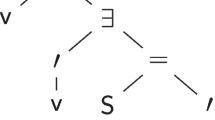Abstract
The paper develops a proof-theoretic semantics for belief reports by extending the constructive type-theoretical formalism presented in Więckowski (Stud Log 100:815–853, 2012) with a specific kind of set-forming operator suited for the representation of belief attitudes. The extended formalism allows us to interpret constructions which involve, e.g., iteration of belief, quantifying into belief contexts, and anaphora in belief reports. Moreover, constructive solutions to canonical instances of the problem of hyperintensionality are suggested. The paper includes a discussion of Ranta’s (Type-theoretical grammar, 1994) constructive account of belief reports.


Similar content being viewed by others
References
Cresswell, M. J. (1975). Hyperintensional logic. Studia Logica, 34(1), 25–38.
Duží, M., Jespersen, B., & Materna, P. (2010). Procedural semantics for hyperintensional logic. foundations and applications of transparent intensional logic. Dordrecht: Springer.
Fox, C., & Lappin, S. (2005). Foundations of intensional semantics. Oxford: Blackwell.
Fox, C., Lappin, S., & Pollard, C. (2002). A higher-order fine-grained logic for intensional semantics. In G. Alberti, K. Balogh, & P. Dekker (Eds.), Proceedings of the seventh symposium for logic and language (pp. 37–46). Hungary: University of Pecs.
Francez, N., & Dyckhoff, R. (2010). Proof-theoretic semantics for a natural language fragment. Linguistics and Philosophy, 33(6), 447–477.
Francez, N., Dyckhoff, R., & Ben-Avi, G. (2010). Proof-theoretic semantics for subsentential phrases. Studia Logica, 94(3), 381–401.
Kripke, S. (1979). A puzzle about belief. In A. Margalit (Ed.), Meaning and Use. Dordrecht: Reidel.
Luo, Z. (2012). Formal semantics in modern type theories with coercive subtyping. Linguistics and Philosophy, 35(6), 491–513.
Martin-Löf, P. (1984). Intuitionistic type theory. Naples: Bibliopolis.
Martin-Löf, P. (1987). Truth of a proposition, evidence of a judgement, validity of a proof. Synthese, 73(3), 407–420.
Martin-Löf, P. (1996). On the meanings of the logical constants and the justifications of the logical laws. Nordic Journal of Philosophical Logic, 1(1), 11–60.
Martin-Löf, P. (1998). An intuitionistic theory of types. In G. Sambin & J. M. Smith (Eds.), Twenty-five years of constructive type theory (pp. 127–172). Oxford: Clarendon Press.
Martin-Löf, P. (1998). Truth and knowability: on the principles \(C\) and \(K\) of Michael Dummett. In H. G. Dales & G. Oliveri (Eds.), Truth in mathematics (pp. 105–114). Oxford: Clarendon Press.
Muskens, R. (2005). Sense and the computation of reference. Linguistics and Philosophy, 28(4), 473–504.
Nordström, B., Petersson, K., & Smith, J. M. (1990). Programming in Martin-Löf’s type theory. Oxford: Clarendon Press.
Pollard, C. (2008). Hyperintensions. Journal of Logic and Computation, 18(2), 257–282.
Ranta, A. (1994). Type-theoretical grammar. Oxford: Clarendon Press.
Saul, J. (2007). Simple sentences, substitution, and intuitions. Oxford: Oxford University Press.
Schroeder-Heister, P. (2012). Proof-theoretic semantics. In Zalta, E. (ed.) Stanford Encyclopedia of Philosophy. Stanford: http://plato.stanford.edu
Sørensen, M. H., & Urzyczyn, P. (2006). Lecture notes on the Curry-Howard isomorphism. Amsterdam: Elsevier.
Sundholm, G. (1994). Proof-theoretical semantics and Fregean identity criteria for propositions. The Monist, 77(3), 294–314.
Thomason, R. H. (1980). A model theory for propositional attitudes. Linguistics and Philosophy, 4(1), 47–70.
Troelstra, A. S., & Schwichtenberg, H. (2000). Basic proof theory (2nd ed.). Cambridge: Cambridge University Press.
Troelstra, A. S., & van Dalen, D. (1988). Constructivism in mathematics. an introduction (Vol. 1). North-Holland: Elsevier.
Więckowski, B. (2008). Substitution puzzles and substitutional semantics. In: Grønn, A. (ed) Proceedings of Sinn und Bedeutung 12. Oslo: ILOS, 645–662.
Więckowski, B. (2010). Associative substitutional semantics and quantified modal logic. Studia Logica, 94(1), 105–138.
Więckowski, B. (2011). Rules for subatomic derivation. The Review of Symbolic Logic, 4(2), 219–236.
Więckowski, B. (2012). A constructive type-theoretical formalism for the interpretation of subatomically sensitive natural language constructions. Studia Logica, 100(4), 815–853. Special issue on Logic and Natural Language edited by N. Francez and I. Pratt-Hartmann.
Więckowski, B. Refinements of subatomic natural deduction. Journal of Logic and Computation, accepted.
Acknowledgments
I have presented parts of this paper at the 8th Scandinavian Logic Symposium at Roskilde University in August 2012, at a Linguistics Colloquium at Goethe University Frankfurt in May 2013, and at the Congress on Logic and Philosophy of Science (CLPS13) at Ghent University in September 2013. I would like to thank the participants at these occasions for their feedback. I am indebted to Nissim Francez, Bjørn Jespersen, and Thomas Ede Zimmermann for very helpful discussions on intensional issues. This paper also greatly benefited from incisive comments by several anonymous referees for Synthese. Support by the Deutsche Forschungsgemeinschaft (DFG grant WI 3456/2-1) is gratefully acknowledged.
Author information
Authors and Affiliations
Corresponding author
Rights and permissions
About this article
Cite this article
Więckowski, B. Constructive belief reports. Synthese 192, 603–633 (2015). https://doi.org/10.1007/s11229-014-0540-0
Received:
Accepted:
Published:
Issue Date:
DOI: https://doi.org/10.1007/s11229-014-0540-0



